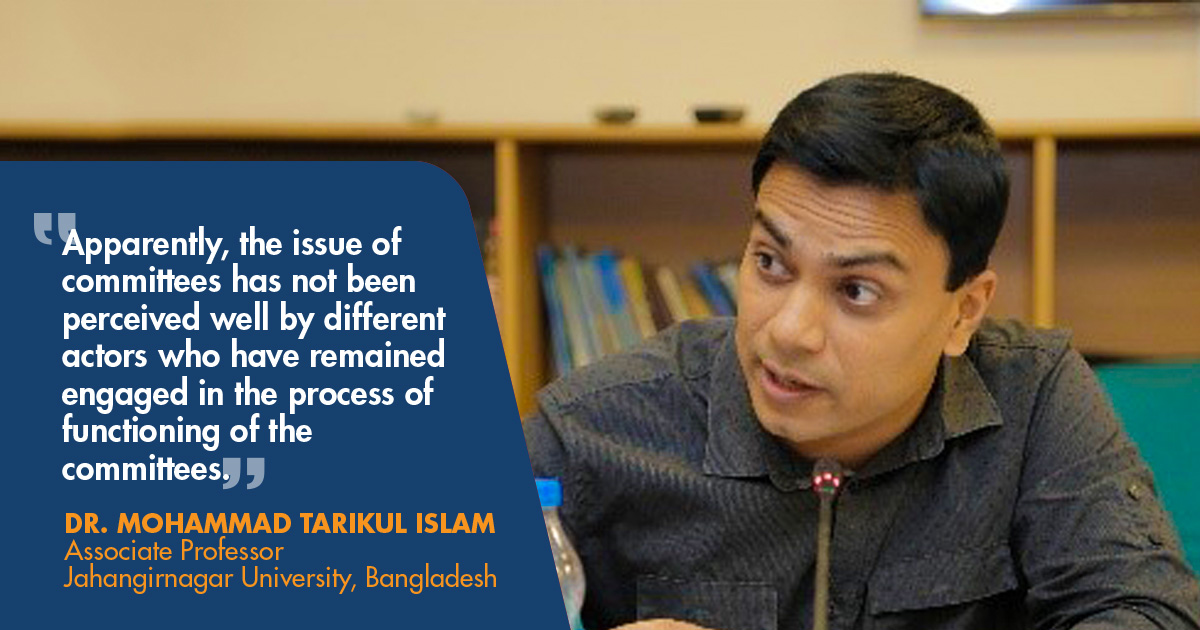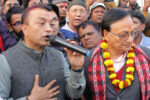A strong local government system has been the core of the political process. As an essential pillar of a democratic and public service transformation, local government is where solving the problems of democratic development has to start.
Local government, therefore, should take the opportunity of devolution further on new methods of service provision, screening that the state isn’t a distant and inflexible monster, but it must do so alongside other services, local and central.
Strengthening local government is an essential element of effective democracy, and effective democracy is a pre-requisite for ensuring good governance. Indeed, democracy works when all people including the most marginalized ones participate in the process of governance, have the capability to ask questions and seek accountability.
As stated by the constitution of Bangladesh, the government should embolden the local government institutions, not control them.
Undesirably, local government bodies, particularly Upazila Parishad could not run with the spirit of self-governance because of the unwarranted meddling of the local administration.
One important way of strengthening democratic institutions without weakening the executive is to make maximum use of committees.
Committees allow the representatives to perform simultaneously numerous important functions that otherwise might not be conducted at all.
These matters may include oversight of executive branch activities; examination of and reporting on the status of implementation of different projects and special investigations.
Since Committees operate under less formal rules committee members are able to discuss issues informally and to develop relationships with committee colleagues who represent different interests.
That creates a collegial environment in which compromises on small matters and technical improvements in overall functioning can be agreed upon expeditiously.
Due to the excessive workload of departmental officials and lack of notification by their line ministries, the member secretaries of the respective committees do not show enthusiasm to expedite the process of functioning of the committees.
As per Upazila Parishad Act 2011, committees act as an important apparatus of safeguarding transparency and accountability of Upazila Parishad.
The Rural Local Government in Bangladesh has three tiers, Zila Parishad (hereinafter ZP) at the top of the hierarchy, followed by the Upazila Parishad (hereinafter UZP) at the middle and Union Parishad (hereinafter UP) at the bottom.
ZP and UP have existed for nearly 140 years They have been involved in various regulatory, promotional and development functions.
Historically, the local government system has been heavily relying upon the central government for funds and resources.
Keeping the issue of accountability of the activities of the UZP, provision [Section 29(1)] has been kept in the Upazila Parishad Act 1998 (Amended up to 1st of December, 2011) (hereinafter the UZP Act, 2011) for setting up of Committees in the UZP.
Exercise of Committees in Upazila Parishad can leverage the coordination efforts of different departments to help the process of service delivery to the poor.
As a matter of fact, the effective functioning of the Committee may offer a number of benefits for the effective functioning of Upazila Parishad. Committees allow informal discussion among members that is required for the development of relationships among members belonging to different political ideologies.
Meetings of Committee act as the forum for reaching to compromise and agreement. It can also provide an opportunity for civil society leaders and experts to express their views in public hearings.
Apparently, the issue of committees has not been perceived well by different actors who have remained engaged in the process of functioning of the committees.
The Committee of the Upazila Parishad is still on paper as departmental officers seem unreceptive to revitalize the committee rather they are more focused to hold a departmental meeting.
Allocation from the respective line ministries always galvanizes and forces them to implement the decisions taken in the departmental committee.
On recurrent follow up departmental officers who are the member-secretary to the Upazila Parishad committees feel it pragmatic to organize a meeting.
Committee meeting for the sake of meeting is undermining the whole spirit of local governance. Even, a notice of meetings is not circulated well in advance in most of the cases.
Member secretaries are not playing the most important role in the functioning of the committees as they are setting agendas and making communication with the chair and other members.
It is very difficult to ensure the presence of the Union Parishad chairs who are the members of different committees.
As a matter of fact, as Union Parishad chairs remain very busy, they have very little or no interest to work in the committees.
The unavailability of the members of the committee sometimes causes reluctance on our part to carry out the responsibilities of the member secretary of the committees.
The essence of the committee system in the Upazila Parishad is still unrevealed to most of the committee members.
Schemes recommended through committee meetings do not get urgency in the regular meeting of the Upazila Parishad.
Besides, most of the Union Parishad Chairmen who are the members of the different committees of Upazila Parishad are not well oriented about their roles and responsibilities.
They show reluctance to attend the meeting rather they find Upazila Parishad meeting a worthwhile platform to materialize their demands.
The effectiveness of the Upazila Parishad Committee should not be predictable unless a sense of ownership creates among the committee members.
Quorum in the committee meeting has come out as a strong barrier in the way of functioning of the committees.
It has been learned in most cases that the Union Parishad chairs instead of attending meetings always request the member secretaries to take their signature whenever they would be available in the Upazila for doing something else.
UN bodies and like-minded donor agencies are found to be operative towards supplementing the efforts of the government in strengthening the committee system of Upazila Parishad.
On the other hand, reluctance on the part of the member secretary has also come out as a prominent cause in the process of functioning of the committee.
The issue of the functioning of committees has not yet received enough prominence among different actors of the Upazila Parishad of non-intervention areas that could motivate members to actively participate in this process.
Due to the excessive workload of departmental officials and lack of notification by their line ministries, the member secretaries of the respective committees do not show enthusiasm to expedite the process of functioning of the committees.
In some cases, it has been observed that member secretaries are not calling meetings of the committees despite consistent pressing by the chair of the committee.
Although clear indication has been provided in the law regarding the constitution of 17 committees, the government did not provide any allocation of funds that are required for the working of the committees.
For instance, the majority of the Upazila Parishads are not in a position to provide funds for bearing expenses relating to holding meetings of 17 committees.
It is to be noted here that TK 100 is provided from the contingency fund of the Upazila Parishad for maintaining the meeting cost of each committee which is very low.
Thus, even where committees have been formed, the chairman and members of each committee do not find any interest to carry out their responsibilities sincerely.
Other reasons behind the sluggish performance of committees may be attributed to a number of factors such as lack of initiatives of Upazila Parishad chairman, vice-chairman and local administration, lack of pressure from the common people, lack of political pressure, lack of skills required for planning and implementing development programs at the local level, no specific terms of references of committees, unwillingness on the part of Upazila Parishad chairman and vice-chairman to delegate authority and even non-existence of Standing Committees or existence only on paper.
For overcoming hindrance that is creating due to lack of proper understanding and knowledge about different aspects of Committees, the coverage of the training needs to be increased.
The main intention of the training would be to provide them a better understanding of the importance of the Committees in the Upazila Parishad and increase their capacity to deal with issues relating to the functioning of Committees.
For inspiring chairmen and members of Committees, the Upazila Parishad should give priority to suggestions placed by the Committees in the Upazila Parishad meeting on different issues.
The essence of decentralized local government in Bangladesh is little encouraging owing to domination by and complete dependence on central/national government; limited or lack of participation of the marginalized section in the decentralized bodies; and absence of political commitment.
Endurance, steadiness and sequential knowledge are to be guaranteed by the committee members. Last of all, to uphold the spirit of transparency and accountability of the Upazila Parishad for attaining equitable and sustainable rural development, there is no alternative other than reinforcing the committee.
Moreover, the local government acts as a delegate Member of the Parliament (MP) with the responsibility to oversee the advancement of the local government bodies as Adviser. UP chairman and members are supposed to follow and implement the advice of the MP.
UN bodies and like-minded donor agencies are found to be operative towards supplementing the efforts of the government in strengthening the committee system of Upazila Parishad.
It provides scope to play an overseeing role of the committees on the functioning of the Upazila Parishad.
In consequence, the effective functioning of the committee may offer a number of benefits for the effective functioning of Upazila Parishad.
First, committees allow informal discussion among members that is a prerequisite for the development of relationships among members belonging to different political beliefs.
Meetings of the committee act as the forum for arriving at cooperation and settlement.
Endurance, steadiness and sequential knowledge are to be guaranteed by the committee members. Last of all, to uphold the spirit of transparency and accountability of the Upazila Parishad for attaining equitable and sustainable rural development, there is no alternative other than reinforcing the committee.
Furthermore, to make the development truly meaningful, involving people directly in the formulation and implementation of decisions must be assured.
This necessitates the decentralization of democracy to the lowest level.
(Dr. Mohammad Tarikul Islam is an Associate Professor of the Department of Government and Politics at Jahangirnagar University in Bangladesh. He is the Visiting Scholar of Oxford and Cambridge. Prior to joining the university, Dr. Islam was serving the United Nations for a period of seven years. As a popular development columnist in South Asia, Professor Islam writes for the LSE South Asia Blog, Cambridge Global Human Movement Blog, Oxford Department of International Development Blog, the Khabarhub, the Daily Star, the Daily Independent, the Financial Express, The Business Time, the Daily Jugantor and the South Asia Monitor regularly)









Comment